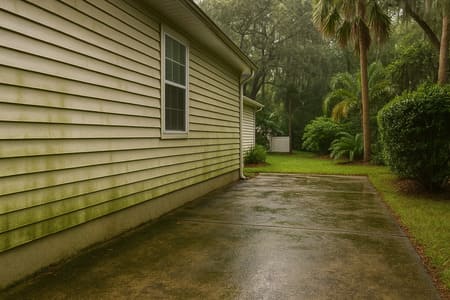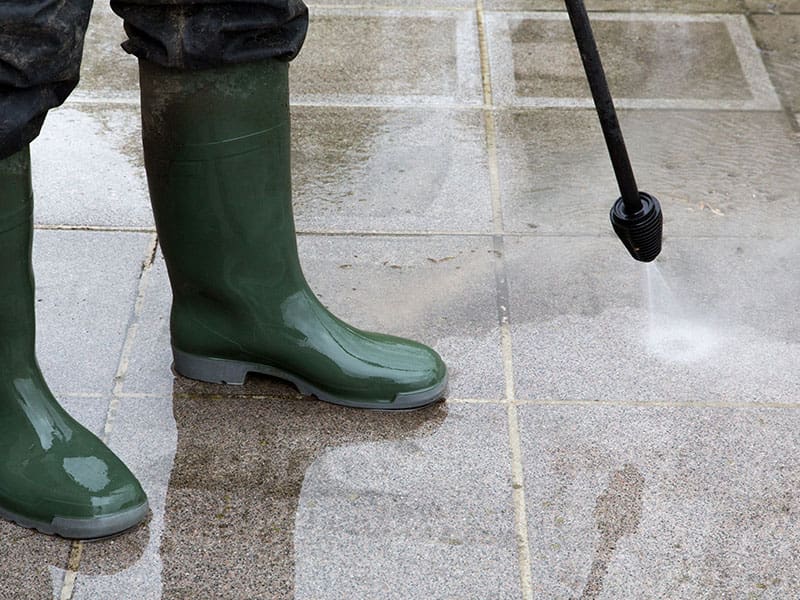Why Pressure Washing Can Backfire in Jacksonville's Climate (and What to Do Instead)

Keeping your home looking clean and well maintained is important, but not every cleaning method works equally well in Florida's humid environment. Many homeowners assume that blasting away dirt with high pressure is the best option, but this approach can actually cause damage when used on the wrong surfaces. Our Jacksonville pressure washing company has seen first-hand what happens when pressure washing is used incorrectly, and we want to help homeowners avoid costly mistakes while still enjoying a spotless property.
The Risks of High-Pressure Cleaning
Pressure washing is powerful, which is both its strength and its downfall. When water is forced out at thousands of pounds per square inch, it can strip paint, scar siding, and even remove protective granules from roofing shingles. In our area, where moisture is already a challenge, that kind of damage can accelerate problems like wood rot, rust, and mold growth.
Another concern is that too much pressure can push water behind siding or into tiny gaps where it lingers unseen. This trapped moisture creates an ideal breeding ground for mildew and algae, both of which thrive in our climate. Over time, this can cause discoloration and even structural damage.
Why Humidity Makes the Problem Worse
Florida's humidity means surfaces stay damp longer, which means any damage caused by pressure washing has more time to worsen. A small chip in paint or crack in concrete may not seem like a big deal at first, but constant exposure to moisture allows algae and mold to take hold quickly. This is why we often recommend alternatives to harsh, high-pressure cleaning methods.
The Soft Wash Solution
Instead of relying on brute force, soft washing uses low-pressure water combined with professional cleaning solutions to safely remove dirt, algae, and stains. This method is ideal for roofs, siding, fences, and any surface that could be damaged by high pressure.
Our team frequently performs pressure washing on hard surfaces like driveways and patios, but we carefully evaluate each surface to make sure we use the right method. This approach allows us to clean effectively without risking the integrity of your home's exterior.
Surfaces That Benefit Most from Soft Washing
If you are unsure when to skip the high-pressure cleaning, here are a few areas where a gentler approach is the safer choice:
- Asphalt Shingle Roofs - High pressure can knock off granules and shorten the life of your roof.
- Wood Fencing and Decks - Too much pressure can splinter wood and force water deep into the grain.
- Vinyl Siding - Excess pressure can warp or loosen siding, allowing water to get behind it.
- Stucco - The surface can crack or chip under high pressure, leading to moisture intrusion.
Choosing the right cleaning method for each surface can save you from future repairs and preserve curb appeal.
Long-Term Benefits of Choosing the Right Method
Using the proper technique means your home stays cleaner longer and you avoid expensive repairs caused by unnecessary damage. Soft washing also kills organic growth at the root, which slows its return and keeps your property looking fresh.
Ready to protect your property and restore its beauty? Contact us today to schedule a safe and effective cleaning.

Recent Blog Articles
-
Rust & Irrigation Stains: The Orange Spots On Your Florida Concrete (And How We Remove Them)
If you've ever noticed stubborn orange or reddish-brown stains creeping across your driveway or patio, you're not alone. Florida's combination of mineral-heavy water, constant irrigation, and humid air creates the perfect environment for these unsightly marks. While they might look like ordinary dirt, these stains are […]
-
How Often Should I Clean My Driveway in Jacksonville? A Month-by-Month Guide
Your driveway takes on more than just vehicle traffic—it weathers Florida’s sun, humidity, rain, and pollen season too. Knowing when and how often to schedule driveway cleaning in Jacksonville is key to maintaining curb appeal and preventing long-term damage. This month-by-month guide breaks down the best […]